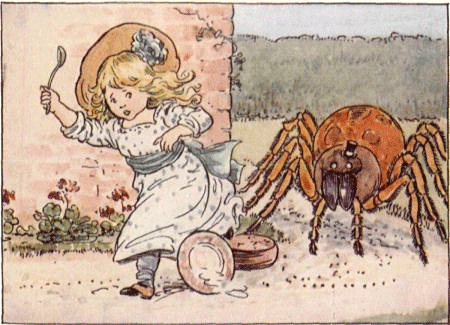“The trouble with the world is not that people know so little, but that they know so many things that ain’t so.” This observation from Mark Twain is one of many illuminating quotes in an examination by Richard Vetter of the power of myth in science and medicine, and the limited power of hard science in dispelling such myths.
Myths are particularly persuasive when they are consistent with pre-existing beliefs, are repeated frequently, and the origins become lost, says Vetter, in a paper in CAB Reviews. Vetter, from the University of California, Riverside, takes as his focus the urban myths that abound regarding spiders.

Be careful to check tuffets before you sit on them
One that is still popular is that spiders (particularly black widows) take up residence in elaborate hairstyles, bite the scalp or lay an egg sac which hatches, and the emerging baby spiders cause death through multiple bites. He points out that there are no records of victims of such attacks, and that baby widow spiders cannot pierce human skin, and have very small amounts of venom.
Another myth is that deadly spiders from South America were brought into the USA via airplane toilets. The story is that a buttock-biting spider, Arachnis gluteus, attacked someone in a restaurant at a Chicago airport. In this case, the story was deliberately spread as a hoax (the names of the restaurant, airport and spider species were all invented), but it spread very rapidly by email. A website was set up to debunk the myth, but it has reappeared in a slightly modified form. Vetter says that the author of the hoax said he set out to show how easily false information that could easily be checked was accepted by the general public.
Vetter talks about how attractive myths are in providing comfort and a sense of understanding in a mysterious world. He says that there is a massive amount of inertia given the psychological condition of being human, which will always act as an obstacle to the replacement of myths with facts. As H.L. Mencken said, “The most common of all follies is to believe in the palpably not true. It is the chief occupation of mankind.”
The paper, Myths based in science and medicine – how they initiate, propagate and the role of peer-review research in dispelling them, appears in CAB Reviews: Perspectives in Agriculture, Veterinary Science, Nutrition and Natural Resources 2010 5, No. 041.
Related News & Blogs
Climate of changing public opinion
This week is Climate Week in the UK, which aims to get the public involved in thinking about climate change. In the scientific community, there is an increasing level of consensus about climate change and the need to take drastic action to limit severe…
21 March 2011

